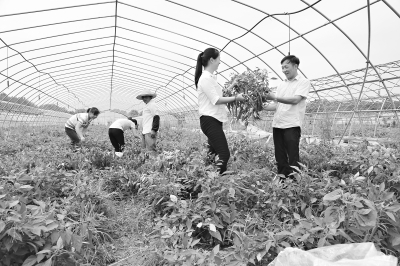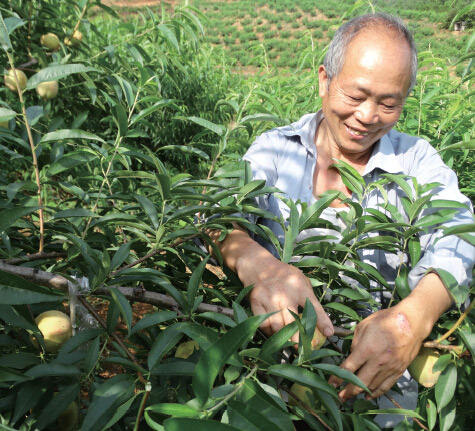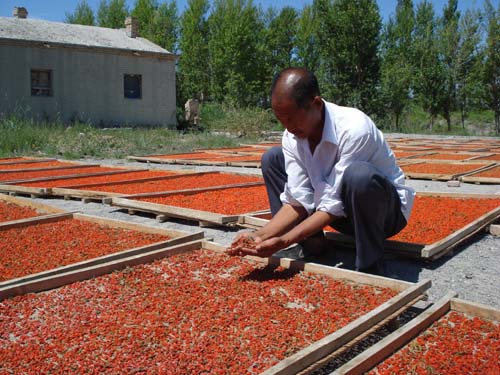More than 300 farmers who graduated from college and went back to their hometown to plant chili peppers became rich together.
Yesterday, Chen Qingguang and his wife in Liuqiao Village, Wangjiahe Street, Huangpi District, dragged more than 100 kilograms of thin-skinned green peppers they had just picked, came to the "Nonglehong" pepper professional cooperative in Qunyi Village, inspected, weighed, and packed boxes of "Nonglehong" chili peppers. Boxes of chili peppers were shipped to the vegetable wholesale market. Chen Qingguang gratefully told the Changjiang Daily: "if we hadn't finally planted chili peppers with Mr. Yang, my family of five would probably have to go back to their hometown."

Yang Yaming (right) and Yang Lanfen are studying pepper planting techniques in the base.
It turns out that Chen Qingguang and his wife are from Henan. A few years ago, they came to Huangpi with their parents and children and rented more than 100 mu of wasteland for planting. At first, I planted radish and corn, but it didn't sell well all the time, and it was difficult for the whole family to live. By chance, I learned that there is a "Nong Le Hong" pepper cooperative in Qunyi village next door, which not only provides farmers with unified pepper seedlings and technical services, but also helps to sell. So Chen Qingguang found Yang Yaming, the head of the cooperative, hoping to join the ranks of growing chili peppers. Unexpectedly, over the past two years, the annual income has reached more than 200,000 yuan. Yang Yaming told reporters: now the cooperative has led more than 300 farmers to grow chili peppers, with a planting area of more than 5000 mu, and farmers' annual income of more than 2500 yuan per mu.
Both husband and wife return to their hometown to start a business.
Yang Yaming and Yang Lanfen, a young couple born and raised in Huangpi, graduated from Huazhong Agricultural University (fractional line, major setting) and Wuhan University of Technology (fractional line, major setting) in 2006. Yang Yaming returned to Huangpi to purchase raw materials in his father's sauce factory, while Yang Lanfen applied to become an accountant in a company in Hankou.
Sauce factories need a lot of chili peppers, but local chili peppers can not meet the needs of sauce factories. In order to purchase high-quality raw materials, Yang Yaming wandered alone in Hebei, Shandong, Hunan, Inner Mongolia and other places. He witnessed the bad habit of abusing food additives in the industry, and finally came up with an idea: can he grow chili peppers in Huangpi himself? thoroughly solve the supply problem of red pepper.
With the support of his father, Yang Yaming transferred 100 mu of land in Liuzhi Street in 2009, introduced and cultivated pepper seedlings, and then provided them to farmers for planting, which was finally purchased by the sauce factory. However, unexpectedly, he suffered a lot from the seemingly simple planting of chili peppers. Due to the high growth of pepper varieties introduced from Hebei, after a heavy wind and rain in the rainy season in Wuhan and exposure to the scorching sun the next day, all the bearing chili peppers rotted in the field, resulting in a loss of nearly one million yuan.
In the following year, Yang Yaming regrouped and fought again. This time he introduced new varieties from Sichuan and finally had a good harvest. However, due to the introduction of hot pepper varieties in Sichuan, not in line with the taste of the local market, resulting in unsalable, once again lost more than 500,000 yuan.
Yang Yaming, who had failed for two years in a row, was not discouraged, while his wife Yang Lanfen, in order to support her husband, resolutely resigned from the company and returned to Huangpi to fight with Yang Yaming. The two men jointly studied the market, delved into chili planting technology, had no funds, and transferred shares in some sauce factories. Finally, they found a variety of chili peppers suitable for growing in Huangpi, and at the same time, they also found that to provide raw materials for sauce factories alone, they had to wait for the chili peppers to turn red, and the cycle was too long; while the amount of green peppers needed in the market was large, they could first sell them on the market, and then provide them to the sauce factory after the last crop of chili peppers turned red.
One husband and wife went out to find a market for technology, and the other worked as a financial accountant at home. Pepper cultivation was finally successful in 2011. Pepper farmers were able to sell both green and red peppers, with a maximum income of 3000 yuan per mu.
Subsequently, the couple decided to attract partners and farmers to take shares, raised 5.72 million yuan, and set up a "Nong Le Hong" pepper professional cooperative to concentrate on the development of the pepper industry.
"Company + Farmer + Market" break into Pepper Market
The planting scale of 5000 mu is not the largest compared to the pepper planting in Hubei. However, Yang Yaming found that most of the chili farmers in the province planted chili peppers separately, and vegetable vendors went to buy them, but once the market situation was bad, no one could harvest the chili peppers planted by farmers, so they had no choice but to let them rot in the fields.
At the beginning, "Nonglehong" adopted the model of "company + farmers", in which cooperatives provided seedlings, chemical fertilizers and pesticides to farmers, and then were purchased and sold by cooperatives. Although farmers have a guaranteed price, but when the market price is high, farmers suffer losses, at the same time, due to the long logistics time, green pepper is easy to rot. Together, Yang Yaming and his wife decided to buy several stalls at the four Seasons Farmers' Market, Baishazhou Farmers' Market, and Changsha Haijixing Wholesale Market. Farmers can go to the stalls of "Nonglehong" and uniformly use the "Nonglehong" brand for sales, while the cooperative gives a commission at the price of 0.1 yuan per jin. If the market situation is not good, the chili peppers of farmers will be purchased by the cooperative.
With the addition of the "market" link, the income of cooperatives and farmers has increased rapidly. Yang Yaming also developed traditional open-air planting, greenhouse planting and other pepper planting models. The time of chili on the market lasted from May to November every year, and the number of farmers involved in pepper cultivation also increased from more than 20 to more than 300. Now Nonglehong's annual sales of green and red peppers have reached 20,000 tons, with an average annual growth rate of 10% and 15%.
There are more than 10 poor households in Shenhuang Village, Luohansi Street. After learning about the pepper industry of the "Nonglehong" cooperative, the village branch secretary took the initiative to find Yang Yaming and his wife. With their help, the poor families planted more than 200 mu of chili peppers together, resulting in an annual income of 500000 yuan, making the poor families happy from ear to ear.
- Prev

Cuihe Village, Ziyun County, Guizhou Province: Slope Huaguoshan Tiantian Wugu Garden
Cuihe Village, Ziyun County, Guizhou Province: Slope Huaguoshan Tiantian Wugu Garden
- Next

The 83 regiment of the fifth division applies sufficient farm manure and Chinese wolfberry to increase the income of workers in the full fruit period.
The 83 regiment of the fifth division applies sufficient farm manure and Chinese wolfberry to increase the income of workers in the full fruit period.
Related
- A course of planting techniques and methods on how to grow carrots
- How to plant the latest tulips?
- Is it better to pick tea in the morning or in the afternoon? When is the best time for tea to be picked? what is the third or fifth tea?
- Launch Yuanxiao Happy combination Haocha + Tea Yuan healthy Taste
- Penghu Tourism "Fireworks 20 Parade with You"
- 2022 West Lake Happiness holds "Digital Revitalization Voucher" and draws iphone13 and laptop.
- Banqiao Fuzhou social houses are designed to change start-up combined with police elimination to create a safe and livable environment
- The convenient measure of "mechanical weeding" in Xinbei has been abused and the Agriculture Bureau has imposed heavy penalties on the illegal land consolidation.
- Changgeng University Joins Hands with Four Memory Factories to Rescue Memory Talent Shortage
- The list of Taiwan's top 100 MVP managers is listed by the Director-General of the Farmers' Association of Sanxia District.

